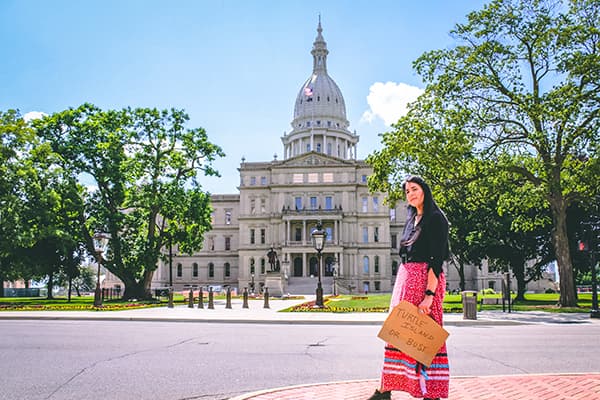Whitney Gravelle, ’16, Appointed to Michigan Women’s Commission

“One of the best pieces of advice that I’ve ever received was if you feel something isn’t being done or there is an injustice out there and you feel really strongly about it, you should take it upon yourself to do something about it,” said Whitney Gravelle, ’16.
Acting on those words, Gravelle saw an opportunity to give tribal communities a seat at the table in state government and took it, resulting in her appointment by Governor Gretchen Whitmer, ’98, to serve a three-year term on the Michigan Women’s Commission. Gravelle is a citizen of Gnoozhekaaning “Place of the Pike,” the current tribal attorney for Bay Mills Indian Community, and the former chief judge for the Bay Mills Tribal Court.
As a new commissioner, and the first MSU Law graduate to be appointed, Gravelle hopes to use her voice as a force for tribal communities throughout the state. “There are 12 federally recognized tribes in Michigan and we can sometimes be forgotten about so I really hope to bridge the gap between resources as well as increase communication and general knowledge,” she said.
An issue that Gravelle hopes to bring to the commission’s attention is the Missing and Murdered Indigenous Women Initiative, which targets the high rates of domestic violence and sexual assault of women in Indian Country. “The Missing and Murdered Indigenous Women Initiative is starting to receive a little more attention on the national level, but I feel it’s very confined to tribal communities,” she said. “With there being 12 tribes in Michigan, I’d really like to focus on how the tribes and the state can work together to ensure not only the safety of tribal women, but all women.”
Gravelle has always had the best interest of her community and others in Indian Country at heart, going as far back as her decision to go to law school at MSU Law, where she worked closely with the Law College’s Indigenous Law & Policy Center. “More than anything I wanted to be able to go home and serve my tribal community, or other tribal communities, and help them in any way possible,” she said.
“There’s a saying in our culture, for the Anishinaabe, that you always live seven generations ahead. What are you doing today and how will that impact the next seven generations?” Gravelle explained. “What good can I impart on the world today, or in the future, that will positively impact the next seven generations? I try to carry that with me and instill it in my work, my daily life, and live each day by that principle.”
Gravelle’s appointment took effect in July 2019 and she will serve until 2022.

